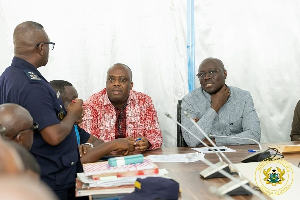Bolgatanga, March 27, GNA- The Upper East Region has so far registered 228 cases of cerebrospinal meningitis of which 28 have died, Dr. James Akpablie, Upper East Regional Deputy Director of Health Services, has said. He indicated that the Region had received vaccines on Cerebrospinal meningitis which would be administered in Bongo District, the declared epidemic zone of Cerebrospinal meningitis.
Dr. James Akpablie, who was addressing a seminar organized by the Regional health directorate on disaster preparedness in the Region on Friday, explained that many disaster situations could be mitigated if effective strategies were put in place in advance. He therefore appealed to all stakeholders to be up and doing and to integrate disaster management issues into their development plans especially health related issues and to deal with them at the preventive stages before they become fully blown.
Dr. Akpablie appealed to heads of agencies and departments not to rely solely on government funds to carry out issues relating to disaster saying that the action plans just needed a bit of sacrifice and commitment. The Deputy Director said the Region had not yet recorded any HINI case and that the National Health Directorate would soon roll out a programme to vaccinate everybody in the country against the H1N1.
He advised people to avoid crowded places, use their handkerchiefs when yawning or sneezing or coughing and to drink a lot of water. Dr. Akpablie also advised people in the Region to be mindful of the outbreak of diseases such as cholera, malaria, typhoid as the rainy season drew closer.
Mr. Gaston Bozie, the Regional Health Promotion Officer, said during disaster periods, the nutritional status of children and women are compromised as they also fall prey to sexual and physical abuse. He cited the 2007 flood that hit the Region where majority of women and children suffered malnutrition and some women raped and girls defiled as they wondered for shelter and warmth.
He therefore stressed the need for stakeholders to consider women and children when planning towards disaster.
The Seminar was aimed at among others, to develop a frame work for emergency preparedness and response peculiar to Northern Ghana, reduce vulnerability of the population to the consequences of any possible disasters, develop emergency communication plan and to share experiences on Disaster.
It was attended by selected departments, agencies, and Non-Governmental Organizations including health staff from the three Northern Regions. Participants were taken through topics including causes, preventive and effects of diseases, risk, vulnerability assessment, mitigation, communicable diseases and Avian flue.
General News of Saturday, 27 March 2010
Source: GNA












